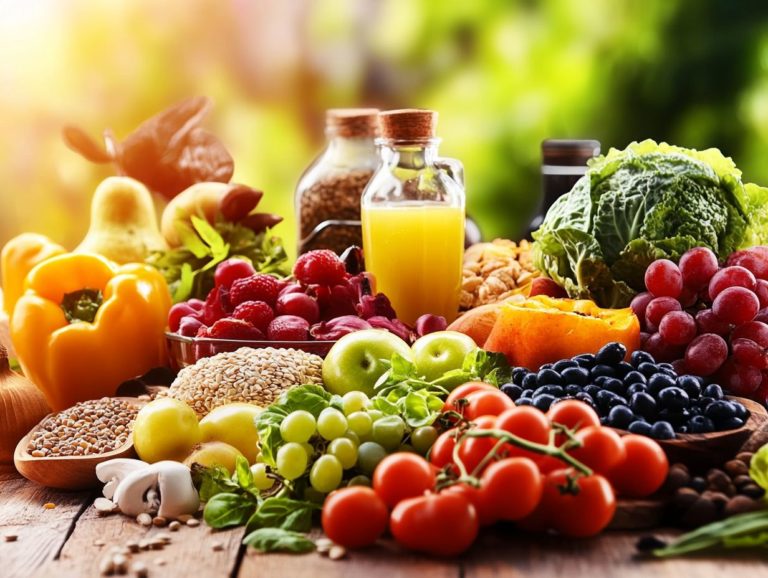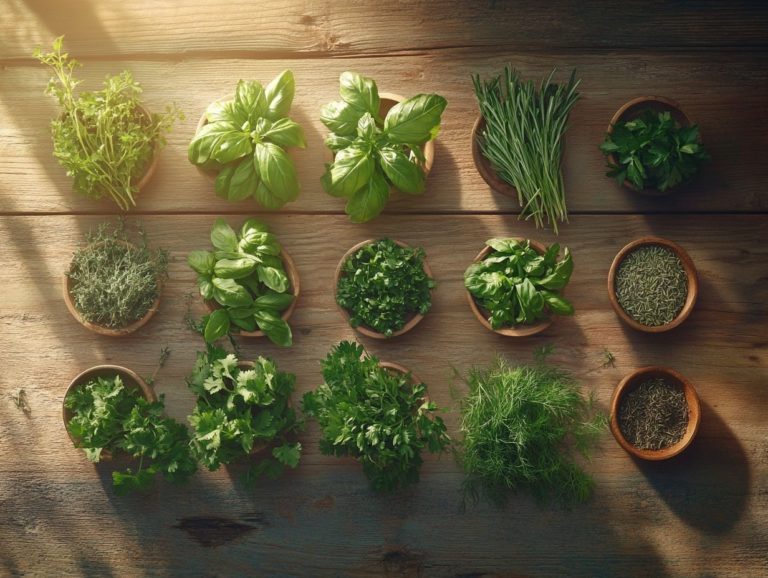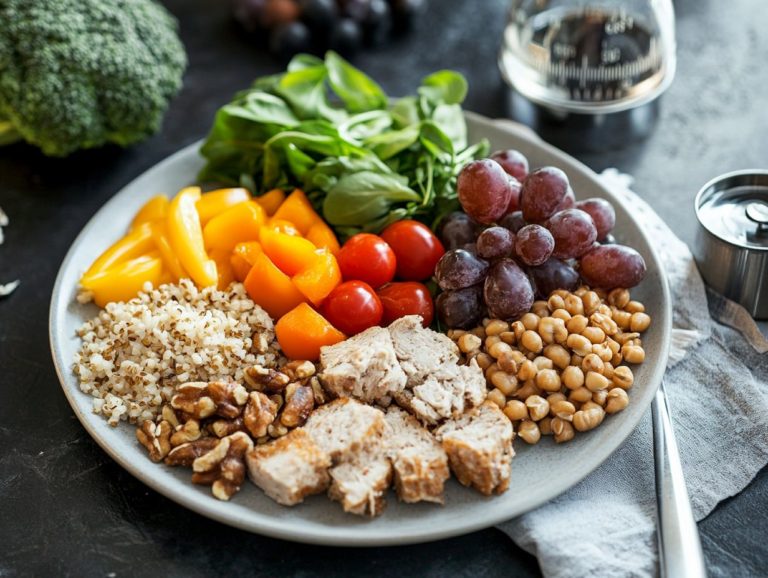5 Ways to Detoxify Your Diet Naturally
Are you sensing a bit of sluggishness or imbalance in your life? It could be an ideal moment for you to explore a natural detox diet.
This article delves into five effective strategies that can help cleanse your body and invigorate your health. By increasing your intake of fruits and vegetables and eliminating processed foods, you’ll discover that these straightforward adjustments can lead to remarkable changes.
The discussion covers the benefits and potential risks of detoxing, tips on maintaining a healthy diet afterward, and recommendations for the best foods to promote optimal detoxification.
Get ready to supercharge your eating habits today!
Contents
- Key Takeaways:
- 1. Increase Your Intake of Fruits and Vegetables
- 2. Drink Plenty of Water
- 3. Cut Out Processed and Packaged Foods
- 4. Incorporate Probiotics into Your Diet
- 5. Reduce Your Sugar Intake
- What Is a Detox Diet and How Does It Work?
- What Are the Benefits of a Natural Detox Diet?
- What Are the Potential Risks of a Detox Diet?
- How Can One Maintain a Healthy Diet After a Detox?
- What Are the Best Foods to Eat for Detoxification?
- How Can You Tell If Your Diet Needs a Detox?
- Frequently Asked Questions
- What are 5 ways to detoxify your diet naturally?
- How do whole foods help detoxify your diet?
- Why is hydration key to detoxifying your diet?
- How do processed foods hinder detoxification?
- Can reducing alcohol and caffeine aid detoxification?
- How does intermittent fasting support detoxification?
Key Takeaways:
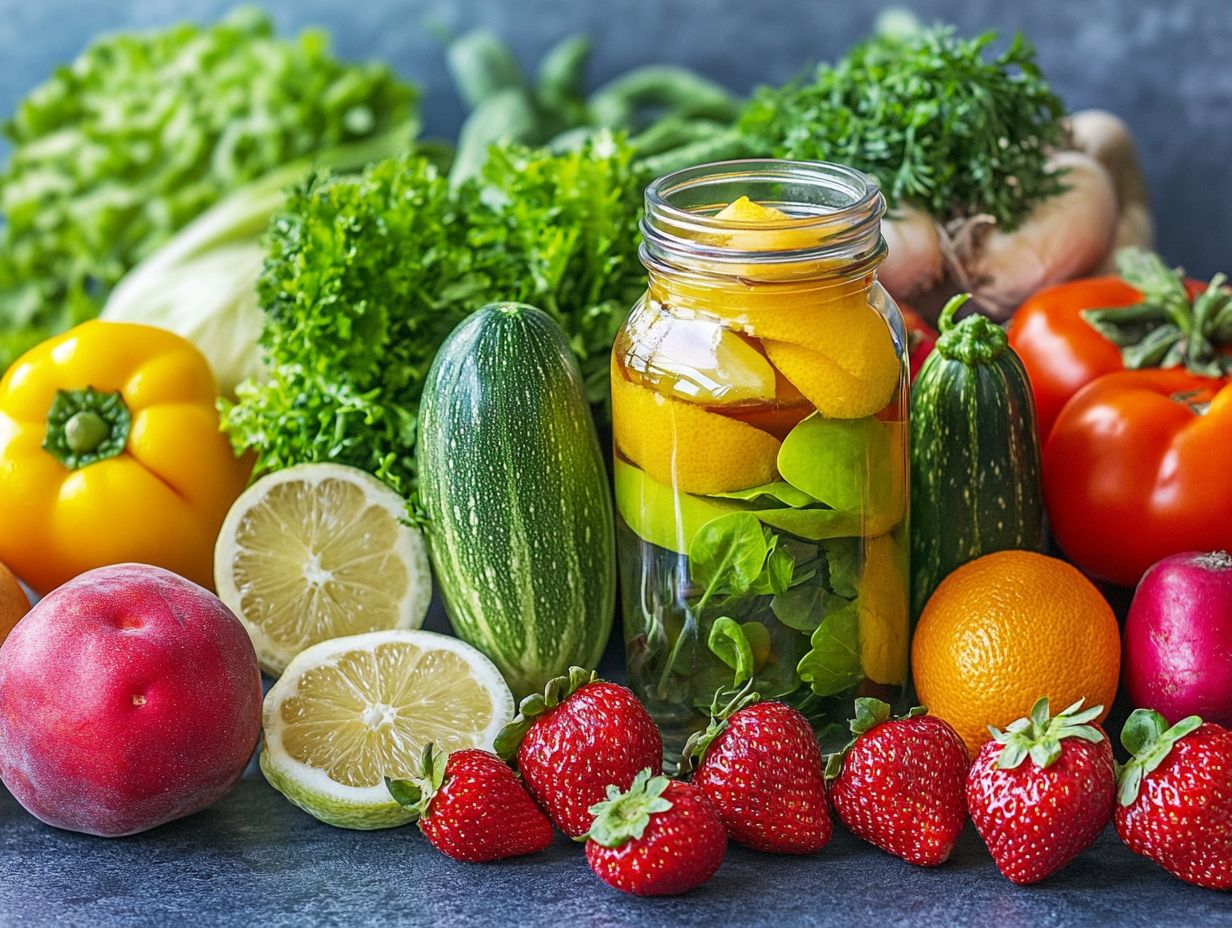
- Boost your fruit and vegetable intake to increase essential vitamins and minerals while flushing out toxins.
- Stay hydrated by drinking plenty of water to aid digestion and detoxification.
- Avoid processed and packaged foods high in preservatives, additives, and unhealthy fats.
1. Increase Your Intake of Fruits and Vegetables
Increasing your intake of fruits and vegetables is crucial for your overall wellness. These foods are packed with antioxidants, vitamins, and prebiotics that support a healthy lifestyle and detoxify your body from harmful substances.
This can lead to weight loss and better management of chronic diseases, as noted by experts like Korin Miller and Emily Dashiell, ND, from Women’s Health.
Among the most advantageous choices are leafy greens like kale and spinach, which are loaded with vitamins A, C, and K, along with fiber to aid digestion.
Brightly colored fruits, particularly berries, offer powerful antioxidants that combat oxidative stress. Citrus fruits like oranges and lemons provide hydration and a generous dose of vitamin C for immune support.
Incorporating these foods into your diet enhances detoxification and promotes healthy skin by improving hydration and elasticity.
To maximize their benefits, consider meal prepping. Chopping vegetables in advance or blending smoothies with a variety of fruits and greens makes it easier to enjoy a nutritious, balanced diet throughout the week.
2. Drink Plenty of Water
Make water your best friend! Drinking plenty of water is essential for maintaining optimal hydration levels, boosting your wellness, and supporting your body s natural detox processes, which can help with weight loss and enhance your overall health.
When your body receives adequate hydration, you’re not just helping your vital organs function efficiently; you’re also contributing to clearer skin and sustained energy throughout the day.
Keeping a refillable water bottle within arm s reach or setting reminders on your phone can seamlessly integrate this into your routine. Don’t forget that herbal teas, like green tea, offer a flavorful alternative while still contributing to your daily fluid intake.
These beverages also keep you hydrated and provide antioxidants that further support skin vitality and aid in detoxification. By adopting these simple habits, you can significantly elevate your overall health and well-being.
3. Cut Out Processed and Packaged Foods
Cutting out processed and packaged foods is vital for detoxifying your body and contributing to a balanced diet that can help reduce the risk of chronic diseases.
These foods are often packed with refined sugars, unhealthy fats, and additives that can lead to insulin resistance, obesity, and a host of chronic health issues.
If you’re looking to enhance your well-being, focusing on whole food alternatives is essential. Incorporating fresh fruits, vegetables, lean proteins, and whole grains into your daily meals can significantly elevate your health.
Simple preparation tips, like meal prepping on weekends and exploring bulk cooking, can make this transition more manageable. By prioritizing natural ingredients, you can cultivate a nutrient-dense diet that supports long-term health benefits.
4. Incorporate Probiotics into Your Diet
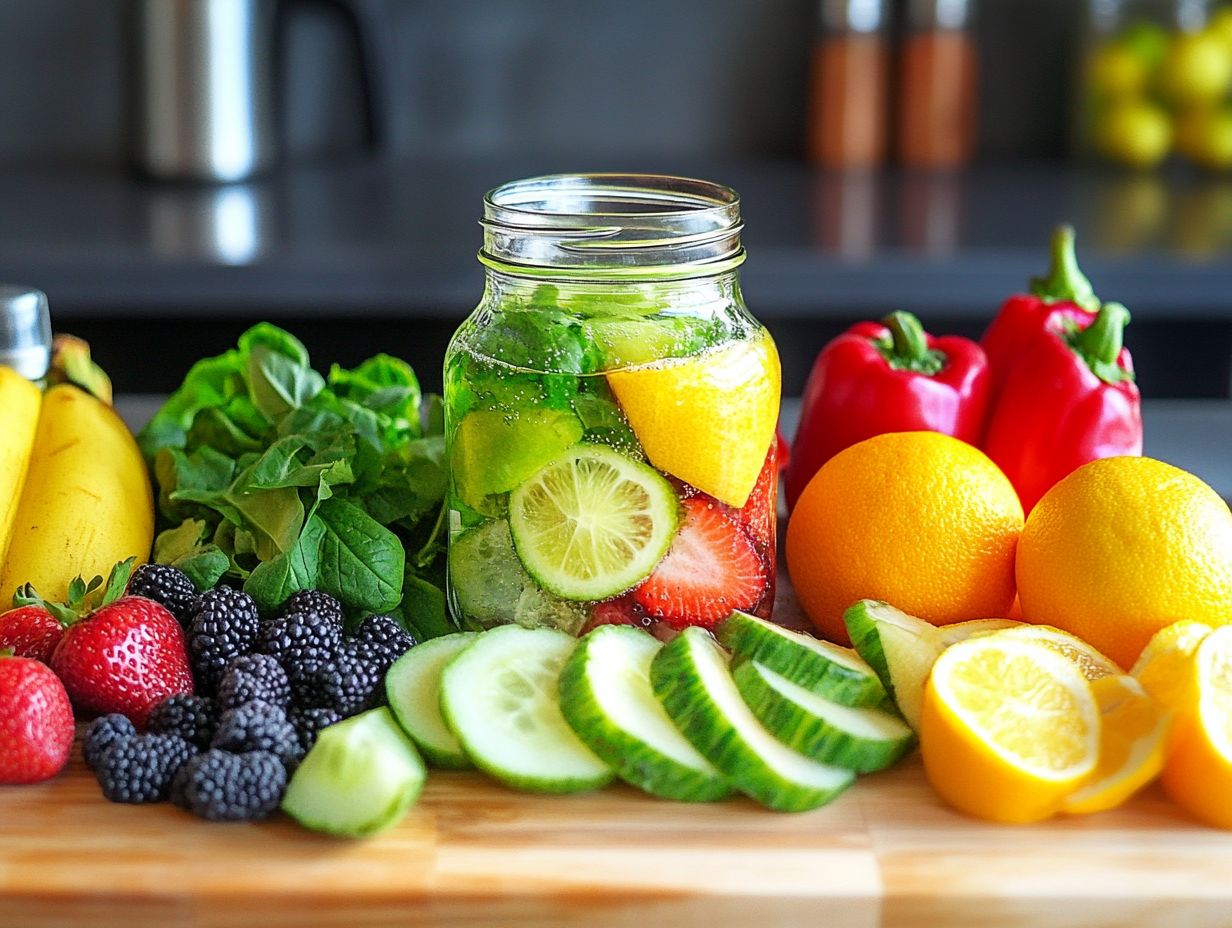
Incorporating probiotics into your diet can significantly elevate your gut health. These beneficial bacteria also work in harmony with prebiotics to enhance your overall nutrition and wellness. Esteemed stomach doctors like Rudolph Bedford, MD, support this view.
Probiotics are central to maintaining a balanced gut microbiome. They support your digestive function and bolster your immunity.
You can easily include probiotic-rich foods like yogurt, kefir, sauerkraut, and kombucha in your daily meals! Imagine starting your day with a delightful yogurt parfait or enjoying a refreshing glass of kombucha at lunch.
Regularly consuming these foods not only aids digestion but also fosters improved mental health and helps reduce inflammation.
Adding probiotics to your meals can greatly improve your health!
5. Reduce Your Sugar Intake
Reducing your sugar intake is essential for effective weight loss. High sugar consumption can lead to issues where your body doesn’t use insulin properly, along with various health complications. This underscores the importance of making informed nutrition choices.
When you consume excessive amounts of sugar, you not only contribute to weight gain but also elevate your risk of chronic diseases like type 2 diabetes, heart disease, and even certain cancers. This stems from the way sugar impacts your metabolism and hormone levels.
Don’t wait! Start cutting sugar today for a healthier future! To gradually lower your sugar intake, consider these steps:
- Read food labels to uncover hidden sugars.
- Substitute sugary snacks with fruits or nuts.
- Opt for whole foods instead of processed ones.
Incorporating more fiber-rich foods into your diet can help manage cravings, making it easier to embrace healthier habits without feeling deprived.
What Is a Detox Diet and How Does It Work?
A detox diet is a carefully planned diet designed to purify your body by eliminating toxins and enhancing wellness through nutrition. Organizations like the National Center for Complementary and Integrative Health underscore the significance of a well-balanced approach to healthcare.
Typically, these diets involve a temporary withdrawal from certain food groups think processed foods, sugars, and caffeine while embracing nutrient-rich ingredients like fruits, vegetables, and whole grains. By adopting this plan, you may enjoy increased energy levels, improved digestion, and enhanced mental clarity.
There are various detox diets to explore from juices and smoothies to specific food patterns each presenting unique health benefits. These approaches can potentially reduce inflammation and encourage weight loss.
Whether you opt for a short-term cleanse or a more prolonged regimen, the fundamental goal remains consistent: to revitalize your body and cultivate a greater sense of overall well-being.
What Are the Benefits of a Natural Detox Diet?
A natural detox diet offers a wealth of benefits, including enhanced wellness, improved weight loss, and a boost in antioxidant intake all contributing to your overall health.
You may find that your energy levels increase, allowing you to be more productive and elevate your quality of life.
Improved digestion is yet another advantage, as a detox diet helps eliminate harmful toxins that can disrupt your gastrointestinal functions. Many individuals also experience clearer skin, boosting confidence and self-esteem.
Healthcare professionals often support these claims, referencing research that demonstrates the substantial health improvements associated with detox diets.
Have you tried a detox diet? Share your story and join the conversation! Personal testimonials from those who have embraced this dietary regimen frequently highlight feelings of revitalization and enhanced well-being, reinforcing the positive impact a natural detox can have on your life.
What Are the Potential Risks of a Detox Diet?
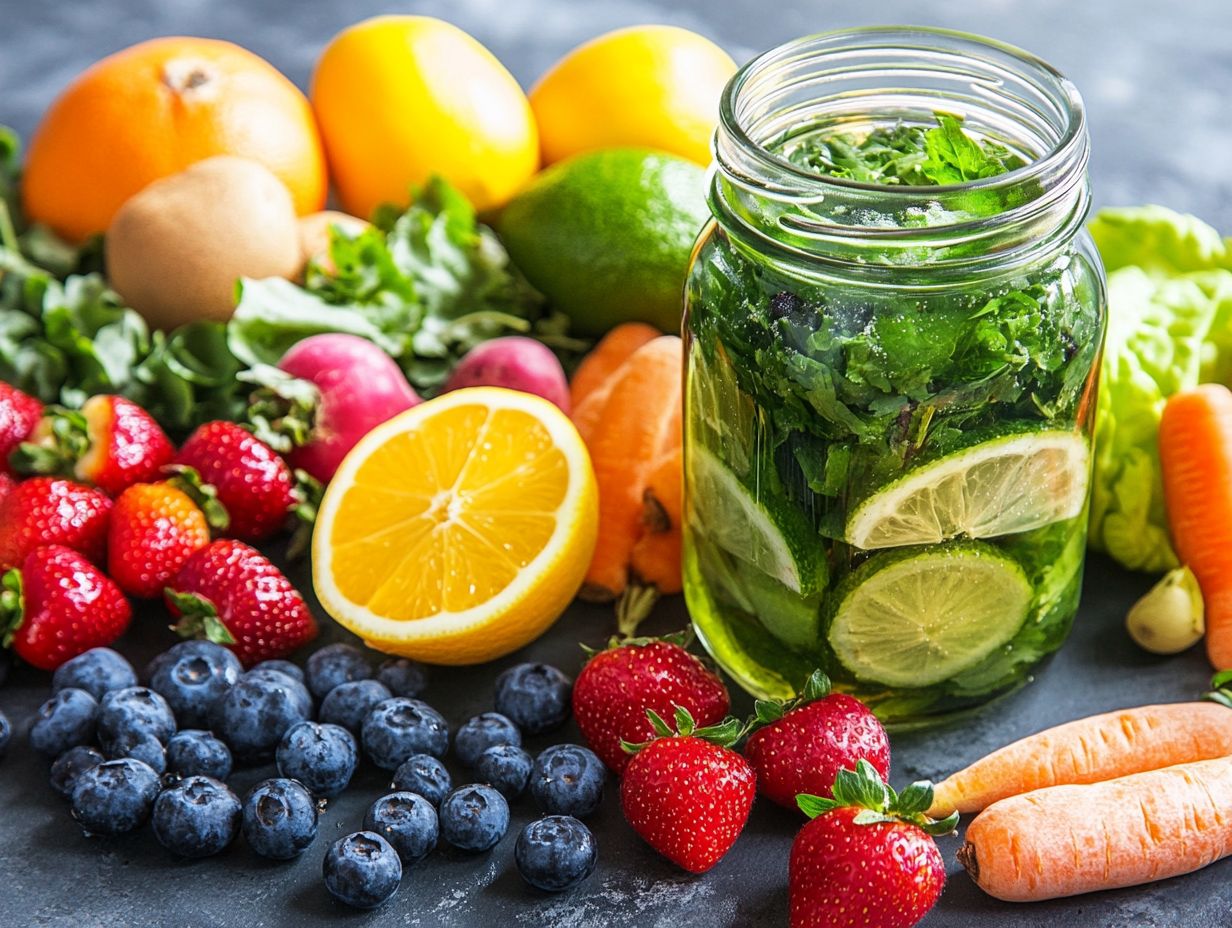
Detox diets can promise health benefits, but they also carry risks. This is especially true if you start without proper guidance from healthcare professionals.
You may face nutrient deficiencies, as many detox diets restrict food intake. This can deprive your body of essential vitamins and minerals.
Such restrictive diets can harm your metabolism. You might feel fatigued and low on energy, making it harder to reach your wellness goals.
If you’re considering a detox program, consult healthcare professionals. They can provide advice tailored to your needs.
Safe practices include gradually adjusting your diet and focusing on whole, nutrient-dense foods. This can help you avoid potential risks.
How Can One Maintain a Healthy Diet After a Detox?
After your detox, it s vital to maintain a healthy diet to keep the benefits. Embrace a balanced diet and commit to a healthy lifestyle.
To smoothly transition back to regular eating, gradually include nutrient-rich foods. Plan meals with colorful fruits, vegetables, whole grains, and lean proteins.
Stay hydrated by drinking plenty of water throughout the day. Pair nutritious choices with regular exercise to boost your energy and overall well-being.
What Are the Best Foods to Eat for Detoxification?
The best foods for detoxification include a range of nutritious options full of antioxidants, vitamins, and minerals. These promote your body s natural cleansing abilities.
Leafy greens like kale and spinach are excellent choices. They help remove toxins and support liver health.
Berries, especially blueberries and strawberries, are packed with antioxidants. Citrus fruits like lemon and grapefruit also aid digestion and hydration.
Incorporate these foods into your meals to enhance your health and support detoxification.
How Can You Tell If Your Diet Needs a Detox?
To know if your diet needs a detox, assess your overall wellness. Look for symptoms like fatigue, digestive issues, and cravings they may indicate it s time for a cleanse.
Be aware of signs such as sudden weight gain or persistent skin problems. Consider both physical and emotional well-being when evaluating your health.
Tracking your changes can provide insights into your eating habits. Don’t overlook professional advice; a healthcare provider can offer personalized support.
Frequently Asked Questions
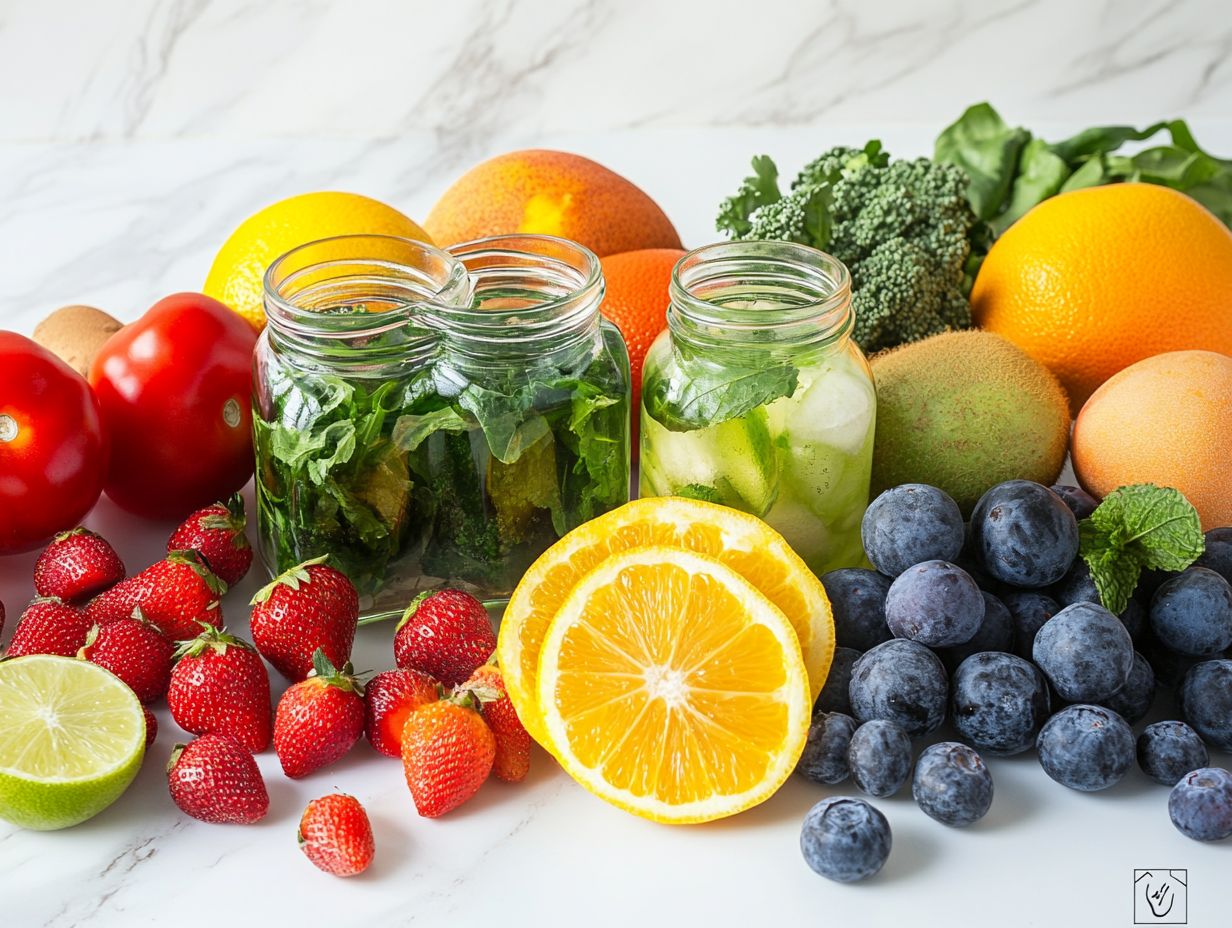
What are 5 ways to detoxify your diet naturally?
1. Incorporate more whole foods: Eating a diet rich in fruits, vegetables, whole grains, and lean proteins cleanses your body.
2. Stay hydrated: Drinking enough water flushes out toxins and keeps your body running smoothly.
3. Cut back on processed foods: Packaged foods are often packed with harmful chemicals.
4. Limit alcohol and caffeine: These can put stress on your liver and kidneys, making detox harder.
5. Try intermittent fasting: Taking breaks from digestion helps your body focus on detoxifying and repairing itself.
How do whole foods help detoxify your diet?
Whole foods like fruits, vegetables, and lean proteins provide essential nutrients and antioxidants. These support your body’s natural detox processes and help eliminate waste.
Why is hydration key to detoxifying your diet?
Adequate water intake flushes out toxins and waste. It also supports digestion and circulation, crucial for detoxification, while preventing constipation that can cause toxin buildup.
How do processed foods hinder detoxification?
Processed foods are high in sugar and unhealthy fats that stress your liver and kidneys. Overconsumption can overwhelm these organs, making detoxification difficult.
Can reducing alcohol and caffeine aid detoxification?
Yes! Cutting back on these substances eases the burden on your liver and kidneys, helping them function better.
How does intermittent fasting support detoxification?
Intermittent fasting allows your body to take a break from digestion. This enables it to focus on repairing itself and getting rid of toxins, improving your overall health.




